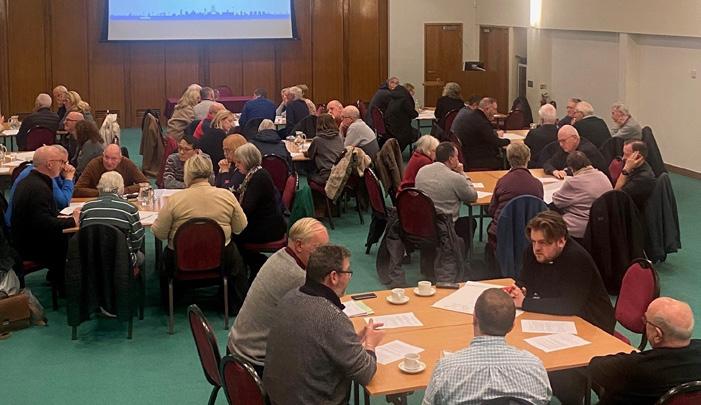
3 minute read
Synod 2023-24 Response to the Continental Stage
On 28 November Archbishop Malcolm met with the members of the 13 Deanery Synodal Councils (made up of lay members and clergy) so that he could listen to what they said before making the requested Diocesan response to the Continental Stage Document of the Vatican Synod.
The time together began with an extended guided reflection on ‘Enlarge the space of your tent’ (Is 54:2) – the theme for reflection given in the DCS (Document for the Continental Stage).
Advertisement
Following the time of reflection, a brief exposition of the main themes of the document was shared and then the three questions were posed in this way:
Q1: After having read and prayed with the DCS, what makes you excited and alive? Which experiences are new, or illuminating to you?
Q2 After having read and prayed with the DCS, what makes you feel anxious or concerned?
Q3: Looking at what emerges from the previous two questions, what do you want to say to the Archbishop for him to share nationally and internationally during the First Session of the Synodal Assembly in October 2023?
The responses to Q1 included these points:
If we can grasp the importance of Baptism this could be transformative.
Much of what has been said ties in with our own Diocesan Synod 2020 process.
We need to come back to the texts of Vatican II
It is good to hear about the recognition of the role of women. Transparency at all levels is needed.
The responses to Q2 included these points: So many of the baptised who for whatever reason are distanced from the church. How do we reach out to these people? Who will lead? How will we cope with less priests? Fear that nothing will happen in the end.
How does the role of Bishops evolve in light of Synodality? Lay people are not as willing to take on the responsibilities. Are decisions already made?
The 3rd question focused directly on what the gathering wished the Archbishop to share nationally and internationally.
The DCS picked up so many of the themes of our own Archdiocesan Synod 2020 that we felt there was a clear recognition of the movement of the Holy Spirit guiding and leading the Church down the Synodal path. There is a real call to change the culture of how we have been living to respond to this invitation.
The first way we can change the culture is to ensure the place of prayer, reflection and discernment in all our processes. There must be found ways of deeper listening which will lead us to more open decision making and taking. This must be done in a transparent way using the gifts of all the baptised, not just the hierarchy. Women need to be empowered in playing a real role in governance structures.
The second way in which we can change the culture is to ensure that the gifts of all the baptised are available to the Church (and the world) and to ensure that these gifts are used. This must open us in a renewed way to the gifts of women. There was a call to find new ways of valuing the gifts of women liturgically and to the need to hear the voices of young people. It is a huge task to try to ensure that all the baptised feel that they have a valued part to play and a respected voice.
The third way in which we are called to be renewed is to journey with people in their lives in new and innovative ways, (accompaniment). We can do this in moments of sacramental encounter but also in the ways we reach out and invite. We must be outward looking. We must not be afraid to meet people where they are without giving up our core beliefs, values or mission. We want to rejoice in our differences and not fear them.
The final way in which we can change the culture and thus move on the synodal path of renewal is in the relationships between priests and parishioners. In the Archdiocese there is a deep respect and love for the priests from amongst the parishioners. But there is also a recognition of the need to renew priests in the way they must play their part in a church that is vastly different now to what it was when many of them were ordained. How can priests and people work together collaboratively with shared responsibility – how can this happen when it is increasingly difficult to get volunteers. How can this happen in a situation where parishioners and priests are getting older?
There was a call from some of the participants for the Archbishop to request married clergy and female deacons.
A final reflection that seemed to sum up much of the sense and feeling of the gathering was this:
The Synod gatherings in Rome in 2023 and 2024 can been seen like a wedding day but synodality is the marriage and we are not just preparing for the wedding by all we are doing we are preparing for the lifelong commitment of synodality, for the journey together of always becoming the church that God is calling us to be.










